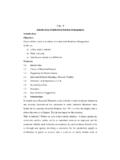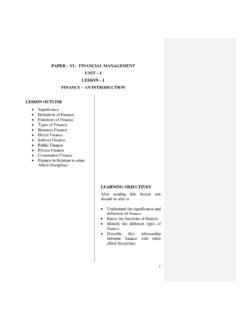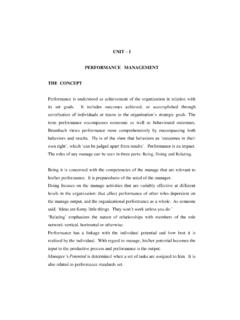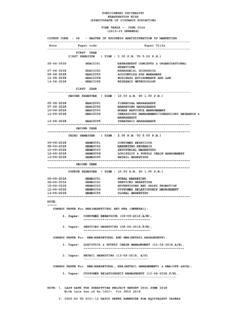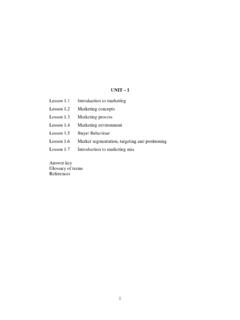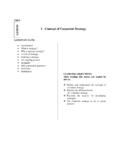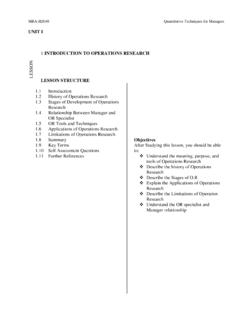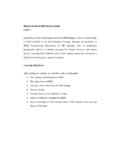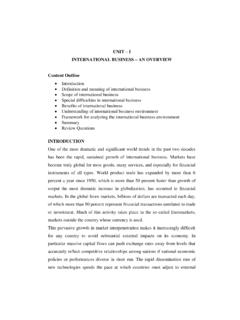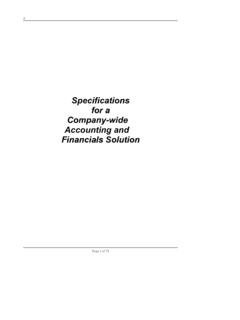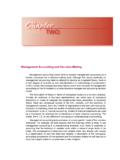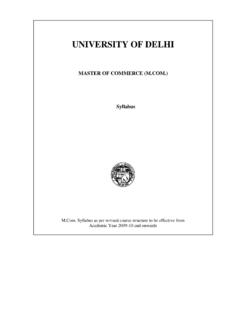Transcription of MBA - I Semester Paper Code: MBAC 1003
1 1 MBA - I Semester Paper code : mbac 1003 accounting For Managers Objectives To acquaint the students with the fundamentals principles of financial, cost and management accounting To enable the students to prepare, analyse and interpret financial statements and To enable the students to take decisions using management accounting Book-Keeping and accounting Financial accounting Concepts and Conventions Double Entry System Preparation of Journal, Ledger and Trial Balance Preparation of Final Accounts Trading.
2 Profit and Loss Account and Balance Sheet With Adjustment Entries, Simple Problems Only - Capital and Revenue Expenditure and Depreciation Causes Methods of Calculating Depreciation Straight Line Method, Diminishing Balance Method and Annuity Method - Ratio Analysis Uses and Limitations Classification of Ratios Liquidity, Profitability, Financial and Turnover Ratios Simple Problems O n Funds Flow Analysis Funds From Operation, Sources and Uses of Funds, Preparation of Schedule of Changes In Working Capital and Funds Flow Statements Uses And Limitations - Cash Flow Analysis Cash From Operation Preparation of Cash Flow Statement Uses and Limitations Distinction Between Funds Flow and Cash Flow Only Simple Problems2 Unit-IV Marginal Costing - Marginal Cost and Marginal Costing - Importance - Break-Even Analysis - Cost Volume Profit Relationship Application of Marginal Costing Techniques, Fixing Selling Price, Make or Buy, Accepting a Foreign Order.
3 Deciding Sales Cost accounting - Elements of Cost - Types of Costs - Preparation of Cost Sheet Standard Costing Variance Analysis Material Variances Labour Variances Simple Problems Related to Material And Labour Variances Only.[note: distribution of questions between problems and theory of this Paper must be 60:40 , problem questions: 60 % & theory questions: 40 %]REFERENCESJ elsy Josheph Kuppapally, accounting FOR MANAGERS, PHI, delhi, Shah, BASIC accounting FOR MANAGERS, Oxford, Delhi, Gupta, FINANCIAL accounting FOR MANAGEMENT, Pearson, Delhi, R, FINANCIAL accounting , PHI, Delhi, I: Basics of AccountingLesson accounting An Introduction accounting is aptly called the language of business.
4 This designation is applied to accounting because it is the method of communicating business information. The basic function of any language is to serve as a means of communication. accounting duly serves this function. The task of learning accounting is essentially the same as the task of learning a new language. But the acceleration of change in business organization has contributed to increase the complexities in this language. Like other languages, it is undergoing continuous change in an attempt to discover better means of communications. To enable the accounting language to convey the same meaning to all stakeholders, it should be made standard.
5 To make it a standard language certain accounting principles, concepts and standards have been developed over a period of time. This lesson dwells upon the different dimensions of accounting , accounting concepts, accounting principles and the accounting Learning ObjectivesAfter reading this lesson, the reader should be able to: Know the Evolution of accounting Understand the Definition of accounting Comprehend the Scope and Function of accounting Ascertain the Users of accounting Information Know the Specialized accounting Fields Understand the accounting Concepts and Conventions Realize the Need for accounting Contents1. Evolution of accounting2.
6 Book keeping and accounting43. Definition of accounting4. Scope and functions of accounting5. Groups interested in accounting information6. The profession of accounting7. Specialized accounting fields8. Nature and meaning of accounting principles9. accounting concepts10. accounting conventions11. Summary12. Key words13. Self assessment Evolution Of accounting accounting is as old as money itself. It has evolved, as have medicine, law and most other fields of human activity in response to the social and economic needs of society. People in all civilizations have maintained various types of records of business activities. The oldest known are clay tablet records of the payment of wages in babylonia around 600 accounting was practiced in india twenty-four centuries ago as is clear from kautilya s book arthshastra which clearly indicates the existence and need of proper accounting and audit.
7 For the most part, early accounting dealt only with limited aspects of the financial operations of private or governmental enterprises. Complete accounting system for an enterprise which came to be called as double entry system was developed in italy in the 15th century. The first known description of the system was published there in 1494 by a franciscan monk by the name luca pacioli. The expanded business operations initiated by the industrial revolution required increasingly large amounts of money which in turn resulted in the development of the corporation form of organizations. As corporations became larger, an increasing number of individuals and institutions looked to accountants to provide economic information about these enterprises.
8 For Prospective investors and creditors sought information about a corporation s financial status. Government agencies required financial information for purposes of taxation and regulation. Thus accounting began to expand its function of meeting the needs of 5relatively few owners to a public role of meeting the needs of a variety of interested Book Keeping And accounting Book-keeping is that branch of knowledge which tells us how to keep a record of business transactions. It is considered as an art of recording systematically the various types of transactions that occur in a business concern in the books of accounts.
9 According to spicer and pegler, book-keeping is the art of recording all money transactions, so that the financial position of an undertaking and its relationship to both its proprietors and to outside persons can be readily ascertained . accounting is a term which refers to a systematic study of the principles and methods of keeping accounts. Accountancy and book-keeping are related terms; the former relates to the theoretical study and the latter refers to the practical Definition Of accounting Before attempting to define accounting , it may be made clear that there is no unanimity among accountants as to its precise definition. Anyhow let us examine three popular definitions on the subject: accounting has been defined by the american accounting association committee as: the process of identifying, measuring and communicating economic information to permit informed judgments and decisions by users of the information.
10 This may be considered as a good definition because of its focus on accounting as an aid to decision american institute of certified and public accountants committee on terminology defined accounting as: accounting is the art of recording, classifying and summarizing, in a significant manner and in terms of money, transactions and events which are, in part at least, of a financial character and interpreting the results thereof . of all definitions available, this is the most acceptable one because it encompasses all the functions which the modern accounting system Another popular definition on accounting was given by american accounting principles board in 1970, which defined it as: accounting is a service society.
